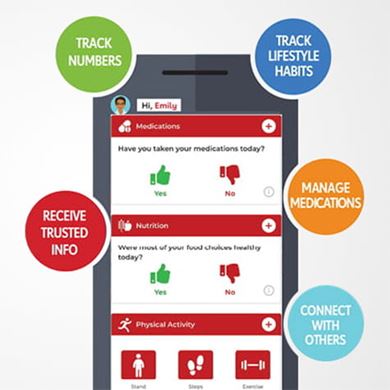Together We Can Prevent Stroke
Prevent a Second Stroke
Nearly 1 in 4 stroke survivors will have another stroke. Managing blood pressure, eating well and staying active, can help decrease your risk — talk to your doctor about managing these factors to help prevent another stroke.
Take prescribed medications and check with your doctor before making any changes.
Resources for Preventing Another Stroke
- High Blood Pressure and Stroke Infographic
- Preventing Another Stroke - 2021 Guidelines (PDF)
- I AM Determined to Prevent Another Stroke Infographic
- What To Do Instead of Having Another Stroke (PDF)
- Taking Steps to Prevent Another Stroke
- Life After Stroke guide (PDF)
- 5 hechos clave sobre el ataque cerebral infografía
- No Tendré Más Ataques Cardíacos ni Cerebrales (Video)
- Aspirin and Stroke
Learn how to spot a stroke F.A.S.T.
-

Face Drooping
Does one side of the face droop, or is it numb? Ask the person to smile. Is the person's smile uneven?
-

Arm Weakness
Is one arm weak or numb? Ask the person to raise both arms. Does one arm drift downward?
-

Speech Difficulty
Is speech slurred or difficult to understand? Ask the person to repeat a simple sentence.
-

Time to Call 911
If you have any of these symptoms or see someone else having them, call 911 immediately!

New!
The Heart & Stroke Helper™ App
Are you looking for support after your stroke? Our tool is designed for stroke survivors and their caregivers to better manage your health all in one place.
Together to End Stroke Anthem
This video brings awareness to the American Stroke Association’s consumer initiative Together to End Stroke which aims to educate consumers that stroke is largely preventable, treatable and beatable.

Read Laura’s storySurvivor Story: Laura Sammons
What started for Laura Sammons and her family in 2017 as a routine weekend drive in the Houston area took a treacherous turn. As she approached an intersection with a stoplight, she blanked out and had no idea how to drive.
Sammons was having a stroke. A year and a half before this, she had experienced a transient ischemic attack, or TIA,— also known as a “warning stroke.”
Secondary Stroke Prevention
 The HCA Healthcare Foundation is the national sponsor of Getting to the Heart of Stroke™
The HCA Healthcare Foundation is the national sponsor of Getting to the Heart of Stroke™